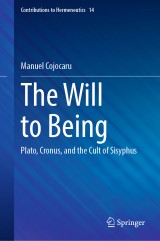Details

The Will to Being
Plato, Cronus, and the Cult of SisyphusContributions to Hermeneutics, Band 14
|
48,14 € |
|
| Verlag: | Springer |
| Format: | |
| Veröffentl.: | 16.07.2024 |
| ISBN/EAN: | 9783031619137 |
| Sprache: | englisch |
Dieses eBook enthält ein Wasserzeichen.
Beschreibungen
<p>This book addresses death and immortality by paralleling Plato’s philosophy of ‘becoming like God’ through exercising one’s intellect and virtues, with the Greek archaic and heroic way of gaining immortal glory through remarkable deeds. In doing so, this study focuses on the explicit and implicit references to earthly immortality and heroism in Plato’s dialogues, arguing for a distinction between the Time-bound ontology of the glory-seeking individual and the Being-centered ontology of the philosopher. Such an underlining of the ontological discrepancy between the ways of the hero and those of the philosopher makes this book a novel academic contribution. The dual focus discloses the clash of ontologies yet also reveals an implicit existential turmoil in Ancient Greek culture as to the anxieties surrounding one’s potential immortality. This title appeals to students and researchers working in Ancient philosophy and existentialism.</p>
<p>Introduction.- Part One Philo sophos, Philo zophos.- 1 The Philosopher Who Stole the Heavens The Immortal Hero and the Challenge of the Eternal.- 2 The Intelligible Universe And the Immortal Philosopher.- 3 Caught Between Becoming and Being.- Part Two time towards Time, time towards Eternity.- 4 The Will to Being and The Cult of Sisyphus.- 5 Philosophy as time towards Eternity.</p>
<p><strong>Manuel Cojocaru</strong> obtained his doctorate in philosophy from the University of Bucharest in 2023, and is currently a Fellow at the University of Tübingen. His work focuses on revealing the implicit existential turmoil of the ancient Greek heroic path, while paralleling it with Plato’s philosophy in order to paint a complete image of ancient Greek views on death and immortality. </p>
<p>This book addresses death and immortality by paralleling Plato’s philosophy of ‘becoming like God’ through exercising one’s intellect and virtues, with the Greek archaic and heroic way of gaining immortal glory through remarkable deeds. In doing so, this study focuses on the explicit and implicit references to earthly immortality and heroism in Plato’s dialogues, arguing for a distinction between the Time-bound ontology of the glory-seeking individual and the Being-centered ontology of the philosopher. Such an underlining of the ontological discrepancy between the ways of the hero and those of the philosopher makes this book a novel academic contribution. The dual focus discloses the clash of ontologies yet also reveals an implicit existential turmoil in Ancient Greek culture as to the anxieties surrounding one’s potential immortality. This title appeals to students and researchers working in Ancient philosophy and existentialism.</p>
Parallels the archaic Greek solution to immortality and the Platonic path towards immortality Addresses the Time-bound ontology of the glory-seeking individual and the Being-centered ontology of the philosopher Original coverage of Sisyphus’ temple and ancient Greek myths illustrating Plato’s philosophy

















